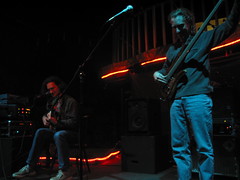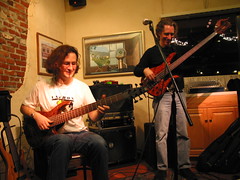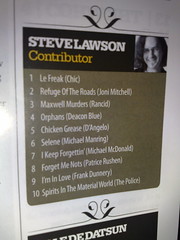Right, here’s a blog post I promised on Twitter at the beginning of the week, but have only just got round to writing. Here were my original ‘tweets’ –
solobasssteve “Blog post idea – the musical mechanics of ‘feeling’: ambiguity, journey, wordless story-telling and narrative/soundtrack quality…”
solobasssteve “Gifted singers routinely sing like they’re still discovering the unfolding tale of the song. Instrumentalists rarely play like that…”
One of the things I work most hard on in my music is developing the relationship between phrasing and feeling. Learning how to play a tune as though it has words and is telling a story. For that reason, most of my biggest influences are singers; the musicians I try and emulate are those whose music strikes me on an emotional, feeling level rather than a technical, heady one.
I often find myself left cold by instrumental music that on the surface I’m impressed by, but which doesn’t seem to soundtrack any part of my life, does reflect anything about the way I think or see the world. And I think I know why…
The big problem with most of what gets lumped together as ‘fusion’ or ‘electric jazz’ is that the way the music is played makes it sound like the artist has all the answers. Like there’s no search, no journey, just an arrival point. And that arrival point is one of dexterity and chops, with the compositions often stemming from a similar place. Or even with the compositions actually being pretty deep, but still being played from a position of having it all sown up before the tune starts.
Great singers never do that. They tell stories, the adopt characters, they emote according to the narrative. They often sing like they are discovering for the first time the unfolding tale of the song. It’s way more important to communicate than it is to show of their wikkid skillz. Having a big range in your voice is part of the singers emotional palette, and is rarely used for shredding (Maria/Celine etc. aside…)
So it’s no coincidence that my favourite instrumentalists also play like that. Bill Frisell is a fantastic case in point – a phenomenally gifted guitar player, who has leant his wide ranging guitar skills to a whole load of different projects, but who always digs deep emotionally. He plays guitar like a world-weary country singer, or a heart-broken torch singer. He does the full range of emotions, rather than sticking with the slightly smug, self-satisfied gymnastic displays of many instrumentalists.
Nels Cline is the same – he can be sad, angry, playful, child-like, inquisitive, tearful, tender… all in the same solo.
And of course there’s John Coltrane, the Godfather of story telling improvisors, unfolding the story of his spiritual quest on the stage each night via his sax. Phenomenal technical skill, completely at the service of the music, or the story, and always stretching, searching, telling stories as they occured to him, risking the blind allies, crying and screaming through his music when it was required.
Q – “So how do I as a bassist head in that direction? What are the mechanics of feeling? How do I move away from dextrous but lifeless technical cleverness and start telling stories?”
The start point is listening and a little analysis. Take a singer you love, a singer that moves you, a singer that connects – what are they ACTUALLY doing? What’s happening in terms of dynamics and phrasing? Where do the notes sit on the beat? Take 16 bars that you really like and learn them. Start by singing them, then play what you sing. Not just the notes, but the dynamics, phrasing, articulation. The whole works. As close as you can get. How far is that from how you usually play?
Here are a few musical elements that aid us in sounding a little more ambiguous, discursive, narrative:
- stop playing everything on the beat: Bassists are the worst for this, but a lot of jazzers too – we end up drawing a metric grid in our minds and stick to it. Divide the bar into 8/16/32 and play those subdivisions. Go and have a listen to Joni Mitchell and tell me how often she’s on the beat. How often her phrasing is metric. Pretty much never.
- Start using dynamics: I’m amazed at how few melody players in jazz – particularly guitarists and bassists – rarely vary the dynamics of what they do.Have a listen to this Bartok solo sonata for violin – hear what’s being done with the phrasing and dynamics? It’s incredible.
Alternatively, have a listen to Sinatra, to the way he pulled the melodies around, and used his amazing control of dynamics. Remarkable stuff. In the rock world, check out Doug Pinnick’s vocals with King’s X. He’s closer to singing in time, but exploits the variation in being ahead of or behind the beat beautifully to spell out the emotion of a song.
- Vary your technique – again, very few singers sing in one ‘tone’ through everything. Those that do usually get tiresome pretty quick. Most of them use tonal variety the way we do when we talk. Getting louder will vary the tone automatically. Same with your instrument. The number of bassists who play with their thumb planted on top of the pickup, using their first two fingers in strict alternation even for playing tunes is bizarre. Bassmonkeys, Your right hand is your primary tone control – forget EQing, and work with the source, where the subtle variations are from note to note. moment to moment, phrase to phrase. Experiment, keeping in mind what you’re trying to do – tell a story!
- Play less notes – At NAMM every year, I get other bassists – often pretty famous ones – coming up and asking me how I play so ‘soulfully’, or so ‘deeply’ or whatever. Admittedly, their reaction to what I do is going to be exaggerated by the lunacy of all the shredding going on, but the simplest answer is often that I play less notes than most of what they are used to listenin to. Again, it’s a singer-thing. Very few of my favourite vocal melodies are technically hard to play. Some have some pretty big intervals in them (Jonatha Brooke, one of my favourite singer/songwriters on the planet, writes some of the most amazing melodies, and has an incredible way of delivering them. She uses really unusual intervals but never sounds like the cleverness of the tune is getting in the way of what’s being said…) So just learn some vocal tunes. Actually, not just ‘some’, learn loads! Get deep into what singers do. Take songs and listen closely to how the tune develops from one verse to the next. Again, great story tellers adapt the phrasing to the emotion of the story, they don’t feel the need to add more and more notes as it goes on…
- Play simply… even the super fast stuff! – the genius of Coltrane was that he very rarely sounded like he was struggling with his sax. He was wrestling with music, and emotion through his sax, he was digging deep to find the soundtrack to his inner journey, but his horn was at the service of that journey, not directing it in a ‘check out this clever shit’ way. Dexterity is a wonderful thing. There’s nothing at all wrong with being able to sing or play really fast. It’s just that it’s not an end in and of itself. Some things sound fantastic when you play them really fast. There are tracks by Michael Manring and Matthew Garrison that have an incredible energy rush to them because of the pace. They wouldn’t have that if they were slower. But neither player sounds like the tunes are a vehicle for a load of mindless shredding. Im always looking to improve my technique by deepening it. Speed is definitely part of that. But it’s just one aspect of control. And control is the key.
I find it really odd when I hear musicians that site Miles Davis as a big influence and then proceed to play like the entire story of the tune was set in stone years ago. Like there’s nothing to add, nowhere new to go, no need to dig deep. Miles is the Yin to Coltrane’s Yang. Miles was a pretty good be-bop trumpeter in the late 40s/early 50s, but he didn’t really have the chops of Dizzie or Chet Baker. And yet he had a quality to his playing, even on crazy-fast bebop stuff, that drew you in, that took you with him… That got deeper and deeper as his life went on. With a cracked and broken sound, he told stories, and wrung out old melodies to find new tales. He also never went backwards, constantly searching for new things in music. The narrative of each solo was reflected in the meta-narrative of the arc of his career. No resting on laurels, lots of progressive work, and not a few false starts along the way. But he was integral to just about every new thing that happened in jazz from the early 50s onwards.
We need to dig deep to find this stuff. It’s not something you just do. Its not something easy, it’s not a lick you can learn and regurgitate, or a solo by such and such a player that you can transcribe. It’s a desire and a search and a longing to tell stories that comes out in our playing, that shapes the way we practice, the kind of musicians we choose to work with, and the risks we take. If you want some inspiration, try looking up some of the following on last.fm:
Guitarists: Bill Frisell, Nels Cline, David Torn, Mark Ribot
Bassists: Michael Manring, Matthew Garrison, Gary Peacock, Charlie Haden
Pianists: Keith Jarrett, Herbie Hancock, Jez Carr, Alan Pasqua
Singer/songwriters: Joni Mitchell, Tom Waits, Paul Simon, Gillian Welch, Jonatha Brooke, Lobelia, David Sylvian, Kelly Joe Phelps, Robert Smith (The Cure), Frank Black (The Pixies)
Music is about way more than impressing other musicians. There’s nothing wrong with musicians being impressed by what you do, any more than there’s anything wrong with people thinking you’ve got a cute accent when you talk… but what you say is what will sustain the value in the long run… Dig deep.



